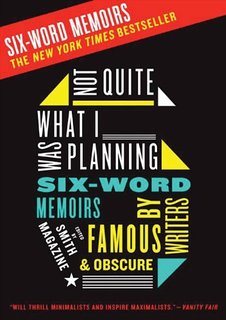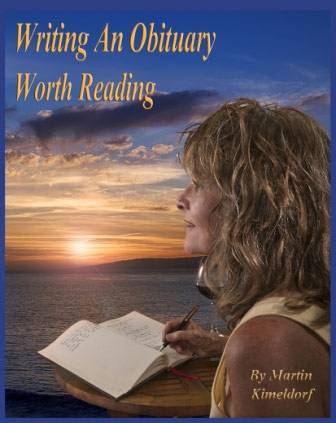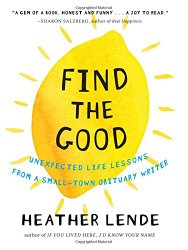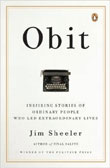The Changing Conversations About Mortality
Brandon Sun, March 27, 2017
David McConkey
There rarely is a convenient time to think about one’s death, eh? Yet, more people are taking the time to do just that. As individuals, as families and as a society, there are advantages to candid talking and advance planning. Part of this contemplation can be writing your own obituary.There has been a bit of a revolution happening in the way we look at death. The book Being Mortal by Atul Gawande (reviewed here two years ago) has become a rallying cry for change at the societal level. Gawande, a U.S. physician, asserts that modern medicine often fails patients at the end of their lives.
What dying patients mostly want, Gawande says, is not medical intervention with harsh treatments, but instead a chance to be at peace and in comfort. To bring about this needed re-orientation of the health-care system, Gawande urges us to talk more openly about end-of-life issues.
At the same time, there are more options for personal discussion and planning. This includes old ideas like making a will and arranging beforehand about a funeral and interment. Newer ideas are drafting a “living will” (health-care directive) and a “legacy letter” (message to the next generation). And here is a brand-new quandary: planning for your online “life” after you die!
Another choice for more people is to enlist the support of others. One way is to contract with a professional caregiver to help with life’s ending, much as a midwife is engaged to help with life’s beginning. Another way is an organized coffee klatch for people to share ideas about death.
The obituary is also changing. There are two kinds of obituaries. One is the news obit of a famous person. The other is of an ordinary individual. The latter has usually been a paid notice in the newspaper classifieds, but today can also include a post on social media.
Newspaper obituaries of well-known people are now being written in a less formal style. As well, media obits of regular people are making more of an appearance. (One example: the feature on the last page of Maclean’s magazine, fittingly named The End.)
And more folks are looking into the notion of writing their own obituary. This can be part of planning ahead, and of saving their family another chore at a difficult time.
An excellent book about crafting your own obit was written last year by American writer and retired teacher Martin Kimeldorf,. The title is Writing an Obituary Worth Reading: A Guide to Writing a Fulfilling Life Review.
Author Kimeldorf immersed himself in what he calls today’s “evolving conversations about mortality.” He read books about end-of-life stages, reviewed legacy letters and researched the art of obituary writing. He also “met with death doulas and brought cookies to the local death café meetings.”
Kimeldorf invited people he knew to compose their own obituary and submit it for publication. The project was a great success: the book contains 20 self-written obits. There were no rules: the submitted obituaries vary in length from six to 900 words. The writers ranged in age from 19 to over 80.
Writing your own obituary can become a springboard to a larger project like a personal memoir or a family history. Another benefit can be the opportunity to take stock of the life you are living, and of the legacy you are leaving.
“The summing up of a life can bring a bit more clarity into your present moment at any age,” Kimeldorf observes. “The experience could renew your focus on your remaining time.”
Writing an Obituary Worth Reading is empowering. The author notes that he intentionally solicited sample obituaries from friends and neighbours – none of whom were professional writers.
“They did it,” Kimeldorf concludes. “You can too.”
* *
*
See Also:
Helping Families Deal with Death "Most Satisfying Work" for Funeral Celebrant
Writing an Obituary Worth Reading: A Review
Being Mortal on Amazon.com (on
Amazon.ca
(on
Amazon.ca )
)
Death Doulas and Death Cafés
Ways to Leave a Legacy
Advocating for Those at the End of Life
Live Well, Do Good
Helping Families Deal with Death "Most Satisfying Work" for Funeral Celebrant
Writing an Obituary Worth Reading: A Review
Being Mortal on Amazon.com
Death Doulas and Death Cafés
Ways to Leave a Legacy
Advocating for Those at the End of Life
Live Well, Do Good
More From Obituary Guide:
- Writing Your Own Obituary Offers Chance for Reflection
- How to Write a Legacy Letter (Ethical Will)
- A Family History Writing Workshop
- Helping Families "Most Satisfying Work" for Funeral Celebrant
- Be Prepared: Will, Health Care Directive (Living Will), and More
Books You May Find of Interest:
Not Quite What I Was Planning:
Six-Word Memoirs

Writing an Obituary Worth Reading:
A Guide to Writing a Fulfilling Life Review

Find the Good:
Unexpected Life lessons From a Small-Town
Obituary Writer

Having the Last Say:
Capturing Your Legacy in One Small Story

Obit:
Inspiring Stories of Ordinary People Who Led Extraordinary Lives
For All Time:
A Complete Guide to Writing Your Family History

Thrive:
The Third Metric to Redefining Success and Creating a Life of
Well-Being, Wisdom, and Wonder

Press Ctrl + D to Bookmark this page

